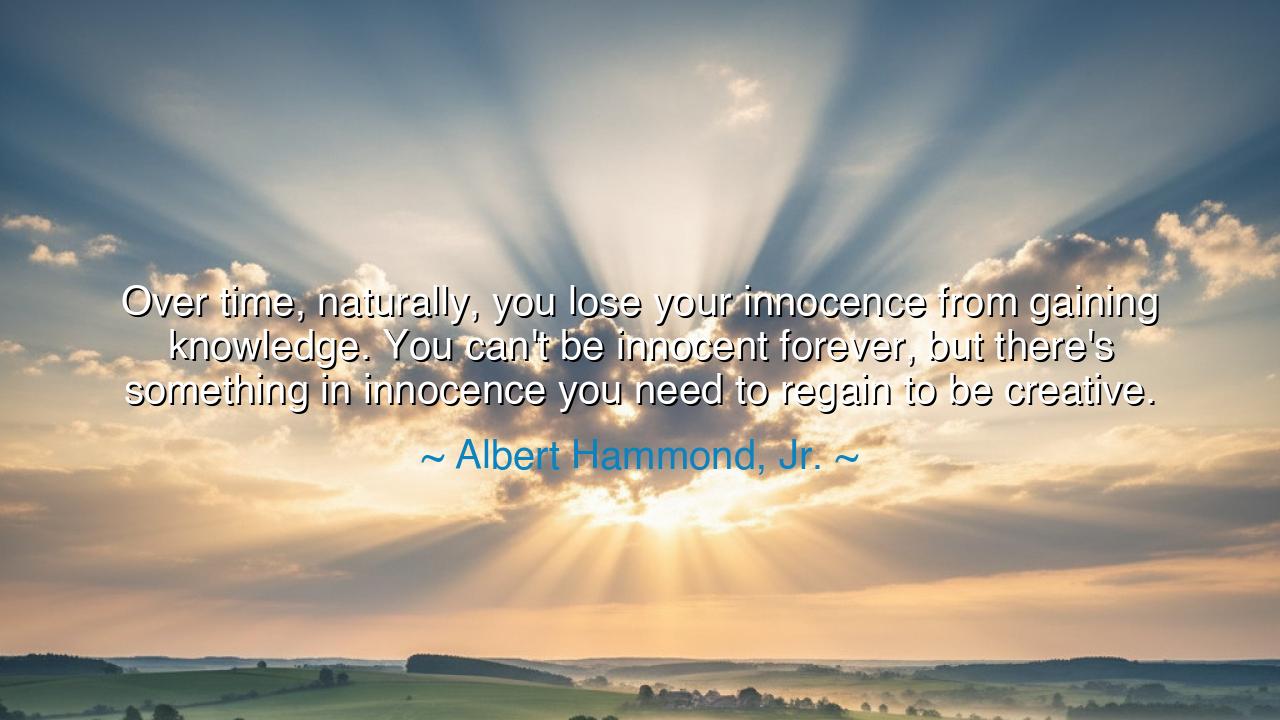
Over time, naturally, you lose your innocence from gaining
Over time, naturally, you lose your innocence from gaining knowledge. You can't be innocent forever, but there's something in innocence you need to regain to be creative.






The words of Albert Hammond, Jr., “Over time, naturally, you lose your innocence from gaining knowledge. You can’t be innocent forever, but there’s something in innocence you need to regain to be creative,” speak to the eternal struggle between wisdom and wonder, between the knowing mind and the unguarded heart. They remind us that knowledge, though a light, casts shadows — and that in the pursuit of mastery, we risk losing the childlike purity that first moved us to dream. In this reflection, Hammond joins a long lineage of thinkers who have seen that the true artist, the true innovator, must live between two worlds: the clarity of understanding and the freshness of awe.
To understand his meaning, we must first see what is meant by innocence. It is not ignorance, nor blindness, but a kind of sacred openness — the ability to encounter the world without cynicism, to see beauty not yet dulled by analysis. When we are young, every color astonishes, every sound vibrates with possibility. But as knowledge grows, we begin to dissect, to categorize, to explain. The world becomes smaller, more defined, less magical. Hammond reminds us that though this transformation is natural — even necessary — something precious is lost in the process. We become skilled, yes, but also guarded; informed, but perhaps less inspired.
Yet, the paradox he describes contains its own redemption. The wise soul can, through effort and humility, regain the innocence they once lost — not by forgetting what they have learned, but by seeing through it. It is the return, not to naivety, but to wonder informed by wisdom. This is what the ancients called “second sight” — the vision that comes not from unknowing, but from seeing anew. The artist, the inventor, the visionary, all must rediscover this state if they are to create. For creation is not born in certainty, but in curiosity — the willingness to be surprised again by what one already knows.
History offers us shining examples of this truth. Consider Leonardo da Vinci, whose mind mastered geometry, anatomy, and physics, yet never ceased to marvel at the flight of a bird or the ripple of water. His notebooks, filled with sketches and questions, reveal not a man of cold intellect, but one who approached science with the soul of a child. His genius came not merely from knowledge, but from innocence reclaimed — from his ability to let wonder lead the way. Many have learned more than Leonardo did; few have loved knowledge as he did. It is that love, not the data, that creates greatness.
Hammond’s words also speak to the condition of our modern age — an era overflowing with information, but starving for imagination. We have learned to measure everything, yet we seldom feel its mystery. The child within us, once thrilled by discovery, grows silent under the weight of certainty. But the creative mind, like a spring, can only flow when it is clear and unclouded by judgment. To regain innocence, one must unlearn rigidity, silence the critic, and let curiosity breathe again. The artist must dare to play, the thinker must dare to wonder, and the soul must dare to feel — for only in such daring does creation arise.
This lesson is not confined to artists alone. In every human endeavor — in science, in teaching, in living — the same principle holds. The physician who sees only the body forgets the mystery of life; the leader who sees only systems forgets the spirit of the people. To live creatively is to see freshly, to let experience serve wonder rather than suffocate it. The challenge, then, is to carry knowledge lightly — to let it be a lantern, not a cage. For the mind that knows too much and feels too little can never give birth to beauty.
Let this be the teaching drawn from Hammond’s words: do not reject knowledge, but let it serve wonder. Learn, master, understand — but never cease to marvel. When life feels dull or mechanical, return to the child within you. Go outside and look at the sky as though seeing it for the first time. Listen to a song as if you were hearing music itself being born. In these small acts of renewal lies the power to restore innocence to the mind and soul.
For in the end, knowledge without innocence becomes arrogance, and innocence without knowledge becomes folly. But when the two are joined — when the wisdom of age meets the wonder of youth — the human spirit becomes divine. That is where creativity lives: in the meeting point between what we know and what we still dare to dream.






AAdministratorAdministrator
Welcome, honored guests. Please leave a comment, we will respond soon